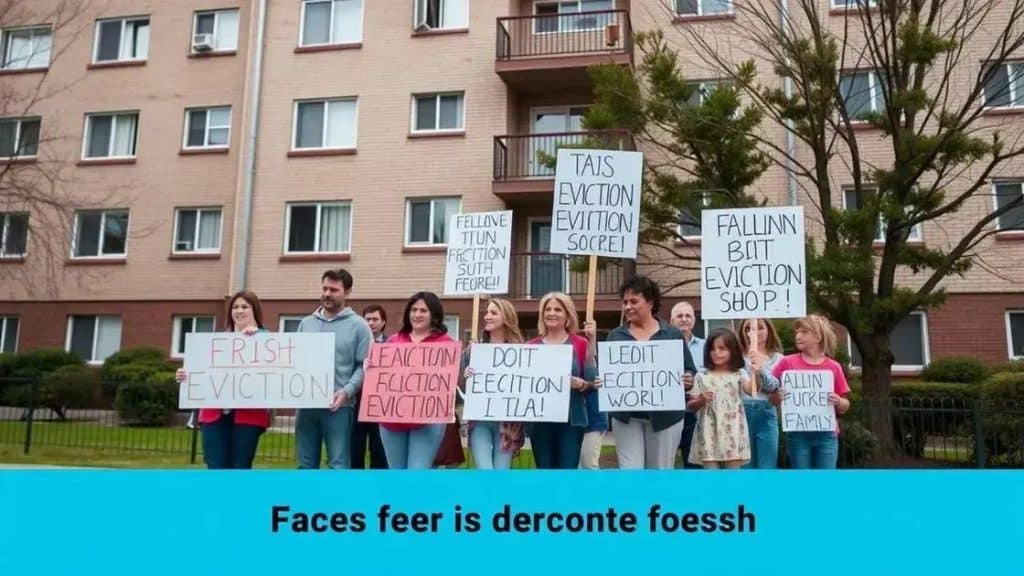Affordable housing crisis leads to eviction surge

Anúncios
The affordable housing crisis leads to a surge in evictions, impacting families and communities, necessitating urgent solutions such as increased funding for affordable housing and community engagement.
Affordable housing crisis leads to eviction surge is a reality many families face today. But have you considered the far-reaching effects this has on our communities? Let’s dive into what’s happening.
Anúncios
Understanding the affordable housing crisis
Understanding the affordable housing crisis is essential in grasping its effects on communities and individuals. This crisis affects far too many people, leaving them struggling to find safe and adequate homes. The factors behind this issue are numerous and can often feel overwhelming, but simplifying them helps in recognizing the overall problem.
Economic pressures play a significant role in the affordable housing crisis. As wages stagnate and living costs rise, families are forced to allocate a more substantial portion of their income to housing. Moreover, gentrification has transformed many neighborhoods, pushing low-income families out in search of cheaper alternatives.
Anúncios
Key Factors Contributing to the Crisis
- Rising construction costs: Increased prices for materials and labor make it challenging to build affordable homes.
- Decreased rental options: A limited supply of affordable rental units leads to more competition among renters.
- Policies affecting zoning: Local laws can restrict new developments, creating barriers to building necessary housing.
- Investment patterns: Investors often favor luxury properties over affordable housing, further exacerbating the shortage.
Despite these challenges, many communities are taking proactive steps to address the affordable housing crisis. Initiatives include increasing funding for public housing and advocating for policies that support the development of low-income housing. However, awareness is the first step. The more we understand the complexities of this crisis, the better equipped we are to take action and support solutions.
The increase in evictions: key statistics

The increase in evictions is a concerning trend that affects countless families. As the affordable housing crisis worsens, understanding the statistics can shed light on the severity of the issue. Tracking evictions helps us grasp the broader implications for communities and individuals.
According to recent reports, eviction rates have surged in various regions. In fact, more than 2.6 million eviction cases were filed in the past year alone, reflecting the ongoing struggle many face to maintain stable housing. This staggering figure serves as a wake-up call highlighting the true scale of the situation.
Key Statistics on Evictions
- Eviction rates: Studies show that the eviction rate increased by approximately 15% over the last two years.
- Demographics: Families with children are disproportionately affected, making up over 40% of those evicted.
- Location disparities: Urban areas experience evictions at double the rate of rural regions, emphasizing the crisis in cities.
- Long-term consequences: About 30% of evicted families report they become homeless afterward, further complicating their situations.
These statistics reveal just how pressing the issue of evictions has become. They illustrate not only the number of families facing displacement but also the ripple effects on neighborhoods and schools. It is essential to consider how such displacements contribute to ongoing cycles of poverty and instability.
While these numbers are alarming, they also highlight the urgent need for intervention. Advocates and organizations work tirelessly to address root causes, assist affected families, and promote policies aimed at reducing evictions. Understanding these statistics is a vital step in fostering awareness and motivating action against the growing eviction crisis.
Real-life stories of those affected by evictions
Real-life stories of those affected by evictions reveal the emotional and psychological toll this crisis has on individuals and families. Each story highlights the struggles of those who face losing their home, providing a human perspective on the statistics.
Take, for example, the story of Maria, a single mother of two. After losing her job due to the pandemic, Maria fell behind on rent. Despite her efforts to find work, she received an eviction notice and had to choose between paying for food or rent. Her experience showcases the tough decisions many families make when financial stability is at risk.
Personal Accounts of Eviction
- John’s Journey: John, a retired veteran, lived in his apartment for over 15 years. When property managers raised the rent significantly, he could no longer afford to stay. His eviction led to a feeling of displacement and loss of community.
- Aisha’s Struggles: Aisha, a college student, faced eviction when her family could not meet the housing expenses while supporting her education. Now, she juggles school and multiple jobs, trying to secure stable housing.
- The Smith Family: The Smiths were forced to move after receiving an eviction notice just months after they had welcomed their newborn. The stress of relocating while managing a new baby strained their relationship.
- Tom’s Resilience: Tom fought against his eviction and found a local organization that helped him negotiate with his landlord. His tenacity and determination highlight that support systems do exist.
These stories reveal that evictions are not just legal cases; they are life-altering events that affect families deeply. They illustrate the impact of affordable housing shortages on everyday lives, where people find themselves facing uncertainty and challenges. As communities work toward solutions, sharing these personal accounts remains vital in raising awareness.
Understanding the emotional weight of these experiences reminds us of the need for empathy, compassion, and actionable solutions to the growing housing crisis. Every eviction represents a common struggle, and by hearing these stories, we can foster a more supportive environment for those who are affected.
Potential solutions to the housing crisis

Potential solutions to the housing crisis are essential in addressing the growing problem of evictions and homelessness. As communities recognize the urgency of this situation, various approaches can help create more affordable and stable housing options.
One promising solution involves increasing funding for affordable housing projects. Governments and private sectors can collaborate to invest in building new homes and renovating existing structures. Furthermore, allocating resources toward housing vouchers can make living expenses more manageable for low-income families.
Strategies to Mitigate the Housing Crisis
- Community Land Trusts: These nonprofit organizations can help keep housing affordable by purchasing land and ensuring long-term affordability for residents.
- Inclusionary Zoning: This policy mandates that a percentage of new developments be affordable for lower-income families, promoting diversity within neighborhoods.
- Rent Control Measures: Implementing rent control can stabilize housing costs and prevent drastic rent increases that often lead to evictions.
- Supportive Housing Programs: These programs offer not only affordable housing but also resources and support services for individuals experiencing homelessness.
In addition to these strategies, community engagement plays a vital role in developing effective solutions. When residents come together to voice their needs, local and state governments can better understand the specific issues they face. Grassroots organizations often push for policy changes that prioritize housing stability and social equity.
Education and advocacy are also crucial. Communities can create awareness campaigns to inform people about their rights as tenants and the resources available to them. By empowering individuals with knowledge, families can better navigate challenges and have a stronger voice against unjust evictions.
Overall, a multifaceted approach that includes funding, policy changes, and community involvement can significantly impact the housing crisis. Implementing these solutions can create a more just and supportive environment for everyone.
FAQ – Frequently Asked Questions about the Affordable Housing Crisis
What is the affordable housing crisis?
The affordable housing crisis refers to the increasing difficulty many families face in finding and maintaining housing that is reasonably priced based on their income.
How does eviction affect families?
Eviction can lead to severe consequences for families, including homelessness, disruptions in children’s education, and long-term financial instability.
What are some potential solutions to the housing crisis?
Possible solutions include increasing funding for affordable housing, implementing inclusionary zoning, and advocating for tenant rights and support services.
Why is community engagement important in addressing the housing crisis?
Community engagement helps amplify the voices of those affected, fosters collaboration among stakeholders, and encourages the development of targeted solutions that meet local needs.





